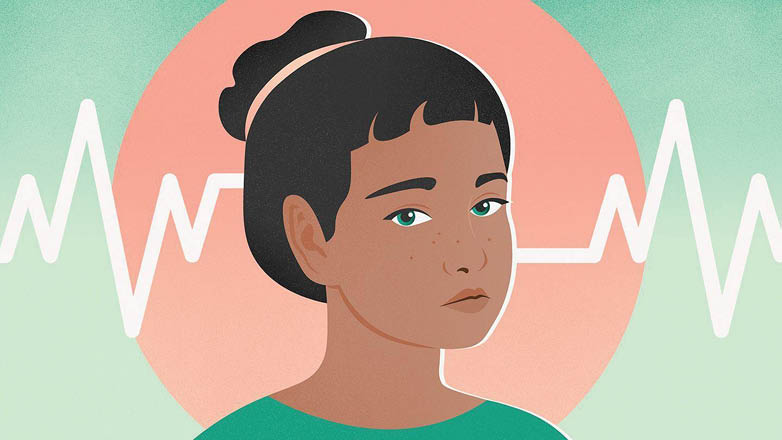Mental health is an important part of overall health and refers to a person’s emotional, psychological, and social well-being. It involves how we think, feel, act, and make choices. Mental health disorders can be short-term or long-term and can interfere with a person’s mood, behaviour, thinking, and ability to relate to others.
Various studies have shown the impact of trauma, depression, anxiety, and stress on the body, including stress on the heart.
A large and growing body of research shows that mental health is associated with risk factors for heart disease. These effects can arise both directly, through biological pathways, and indirectly, through risky health behaviours. ‘Heart Health’ and ‘Mental Health’ have always shared a bi-directional relationship with each other – essentially, the brain and the heart are a part of the same body, and hence affect each other.
People experiencing depression, anxiety, stress, and even Post Traumatic Stress Disorder (PTSD) over a long period of time, may experience certain physiological effects on the body, such as increased cardiac reactivity (increased heart rate and blood pressure), reduced blood flow to the heart, and heightened levels of cortisol. Over time, these physiologic effects can lead to calcium build-up in the arteries, metabolic disease, and heart disease. Research also shows that mental health disorders, like depression, anxiety and PTSD, could develop after cardiac events, including heart failure, stroke and heart attack.
The ‘Head-Heart’ connection should be on everyone’s radar – a higher prevalence of mental diseases in heart patients (especially coronary artery disease) has been established. Your heart pumps blood through vessels to every part of your body, including your brain. Damage to blood vessels can lead to serious health conditions, such as heart disease, stroke, and even dementia.
Anxiety and depression are two mental health conditions commonly related to heart disease and its effects are widely studied. As per research by The European Society of Cardiology (2019): “One in five cardiac rehabilitation patients are depressed, anxious or stressed.” Heart patients exhibiting traits of depression are more likely to feel despondent and hopeless. This reduces their ability to manage their symptoms, they may minimise successes and exaggerate failures, thereby reducing their motivation to exercise and complete a cardiac rehabilitation programme.
 Anxiety could lead to fear of another cardiac event and stop people from being active. People with anxiety underestimate their abilities – for example to walk on a treadmill or doing basic physical activities. Depression and anxiety can also impair the ability to retain new information needed to make health-related behaviour changes. Sharing of fears and concerns helps health care providers understand a patient’s needs and determine the best care for that individual.
Anxiety could lead to fear of another cardiac event and stop people from being active. People with anxiety underestimate their abilities – for example to walk on a treadmill or doing basic physical activities. Depression and anxiety can also impair the ability to retain new information needed to make health-related behaviour changes. Sharing of fears and concerns helps health care providers understand a patient’s needs and determine the best care for that individual.
For individuals with a pre-existing cardiac condition, adjusting to a serious health condition often takes time. It’s normal to have some degree of fear and stress. But how long these feelings linger, and whether they are also associated with symptoms of depression or anxiety, can affect your recovery success and potentially increase your risk of future problems.
Psychological and social functions are often strong predictors of quality of life and therefore require attention. Here are some principal Mental Health tips for individuals with Cardiac concerns:
Being Aware And Accepting Your Emotions: It’s important to understand that every person is unique and therefore each one’s road to recovery is unique – even with the same / similar diagnoses. There are no fixed set of emotions that one has to undergo. Each individual has his/her own unique way of processing their experiences and emotions.
Accepting Both Positive And Negative Emotions: It is vital that we acknowledge all our emotions – positive and negative. Negative emotions are not bad – in fact, at times these are healthier and more realistic. This is a very effective tool to understanding and managing stress and anxiety.
Manage Stress: Research shows that stress contributes to various health problems, including increased risk of heart disease. Regulating stress is an important part of preventing and treating heart disease. Studies have shown that if you learn to manage stress, you can better control your heart rate and blood pressure.
Connection: Going through any major health condition can often be an isolating experience. Therefore, it’s important to stay connected with family and friends. Taking time for having conversations and sharing your emotional concerns is one of the best ways to make sense of them and to cope effectively. Let’s not imprison ourselves in the clutches of loneliness.
Accept Support: Getting help from friends and family goes a long way in aiding your recovery. Research shows that people with greater social support build their resilience and experience less depression and anxiety.
Avoid The Mental Traps Of: (i) Catastrophizing: this distortion involves exaggerating the meaning, importance, or likelihood of things; (ii) Comparison: simply comparing your journey to someone else’s, sometimes even without having any common factors, and thus setting unrealistic and faulty assumptions and goals for oneself; and (iii) Jumping To Conclusions: refers to the tendency to make conclusions and predictions based on little to no evidence and holding these as the ultimate truth.
Being More Mindful: Mindfulness means maintaining awareness of our thoughts, feelings, bodily sensations, and surrounding environment, through a gentle, nurturing lens. Mindfulness also involves acceptance – meaning that we pay attention to our thoughts and feelings without judging them, without believing, for instance, that there’s a ‘right’ or ‘wrong’ way to think or feel in a given moment.
Do Not Be Afraid To Reach Out For More Help: This is an extremely crucial point. Remember, knowing and understanding your challenges, is a strength. Reaching out for help is an intelligent step towards self-survival.
- Gift Yourself A Mental Detox On Navroz! - 15 March2025
- The Food And Mood Connect: Eating Your Way To A Healthier Mind - 1 March2025
- Beating The ‘Cascade Effect’ In 2025 - 28 December2024
